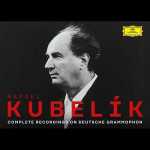
Orchestra: Bavarian Radio Symphony Orchestra, Waldemar Kmentt, Janet Baker, Rafael Kubelik, Symphonieorchester des Bayerischen Rundfunks
Conductor: Rafael Kubelik
Composer: Gustav Mahler
Audio CD
Number of Discs: 1
Format: FLAC (tracks+cue)
Label: Audite
Size: 282 MB
Recovery: +3%
Scan: yes
01. Das Lied von der Erde: Das Trinklied vom Jammer der Erde
02. Das Lied von der Erde: Der Einsame im Herbst
03. Das Lied von der Erde: Von der Jugend
04. Das Lied von der Erde: Von der Schönheit
05. Das Lied von der Erde: Der Trunkene im Frühling
06. Das Lied von der Erde: Der Abschied
Possibly the finest “Das Lied” on record
Rafael Kubelik never recorded “Das Lied von der Erde” commercially, yet we have this 1970 concert performance from the archives of Bavarian Radio, whose orchestra Kubelik led at the time. No allowances whatsoever need to be made for this being a one-off live recording. Sonically, it’s at least a match for the studio set of the symphonies (now my reference “box” in this repertoire) that Kubelik was making for DG at the time, and technically the orchestral playing is pretty immaculate.
Where this really comes together, though, is in the self-effacing and wonderfully astute conducting and in the expressive performances of Dame Janet Baker and Waldemar Kmentt. Kmnett is perhaps not as golden-toned as Fritz Wunderlich in the classic Otto Klemperer set, but he pays more attention to the words and their meaning, and differentiates more clearly among the three tenor songs. Dame Janet would go on to record this in the studio with Bernard Haitink (and she may be also be heard in a recording conducted by Raymond Leppard) and for some that 1975 set is the definitive “Das Lied.” Here she is fresher of voice and just a shade lighter of tone, and if the world-weariness she conveyed so affectingly in the Haitink is not quite as evident here, that may be due more to an interpretive choice than to any inability at that stage in her career. And it fits in with a conception of the song-cycle (or symphony for tenor and alto voices and orchestra) as being about the beauty and wonder of living as well as about the finite, transient nature of human existence. A performance of light and shade, in other words–and on all counts difficult to beat despite the many outstanding recordings of this work.



